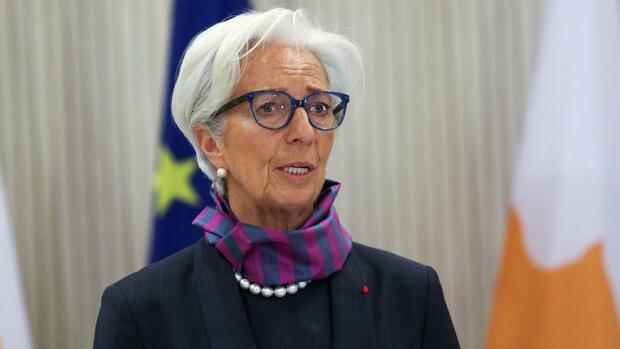Nicosia, Prague, Vienna Despite the war in Ukraine lasting more than a month, the ECB does not believe that the euro zone is heading for stagflation. There were no signs of a sustained recession or ever higher inflation, ECB President Christine Lagarde said in Nicosia on Wednesday.
Although there are inflation drivers such as energy and food costs, it cannot be assumed that these will continue to move “higher and higher”. However, the invasion of Ukraine is fundamentally causing a loss of confidence and is clouding the economic outlook: “In the short term, we will be confronted with higher inflation and lower growth,” warned the Frenchwoman.
The longer the war lasts, the higher the economic costs will be. This also increases the risk of an unfavorable scenario for the economy. Business investment is likely to suffer from the conflict. Consumer sentiment has already clouded over, Lagarde said.
This is also confirmed by the data from the EU Commission: the mood in the euro zone economy plummeted in March as a result of the war. The biggest downturn was in consumer sentiment.
Top jobs of the day
Find the best jobs now and
be notified by email.
In industry, too, things are clouding over. Retailers are also more pessimistic, while service providers are more optimistic.
The ECB intends to end its multi-billion dollar bond purchases in the third quarter if the inflation outlook allows. The shutdown of this program is seen as a precursor to an interest rate hike which, according to the ECB, is to take place “some time” after the end of the bond purchases.
Rate hike in September?
Council member Peter Kazimir believes that the ECB could initiate a turnaround in interest rates towards the end of the year. However, this only applies if the war does not escalate dramatically, said the head of the Slovakian central bank.
He was in favor of the ECB moving out of the negative range within a year with the so-called deposit rate. This is currently at minus 0.5 percent. This means that banks have to pay penalty interest if they park excess money with the central bank.
>> Read also: German inflation rises to 7.3 percent – the highest value in around 40 years
Austria’s head of the central bank, Robert Holzmann, is pushing for these penalty interest rates to be abolished by the end of the year. In his view, a first rate hike is already possible in late summer.
If there are no more new securities purchases in July, the first interest rate step could be taken as early as September, he said in Vienna. A second could follow in December: “That would be consistent with the announcements.”
A tightening of monetary policy is his wish, but certainly not just an illusion, said Holzmann: A number of his colleagues on the Governing Council have also made similar statements.
He expressly referred to the Dutch central bank chief Klaas Knot. This had not recently ruled out two rate hikes in the current year.
More: Hackers steal $600 million in cryptocurrencies from a computer game
